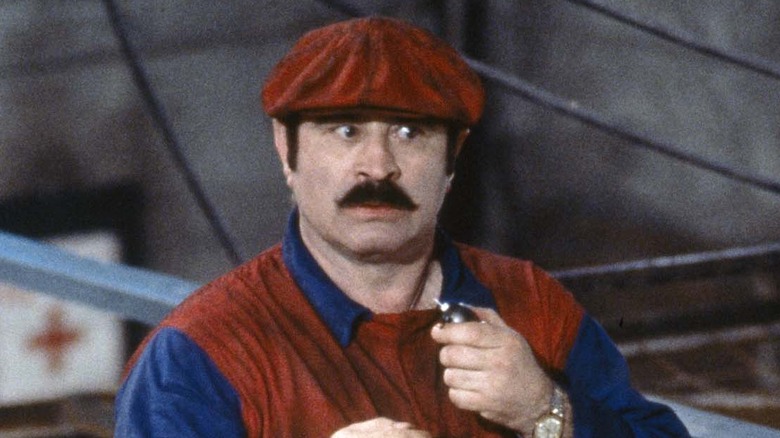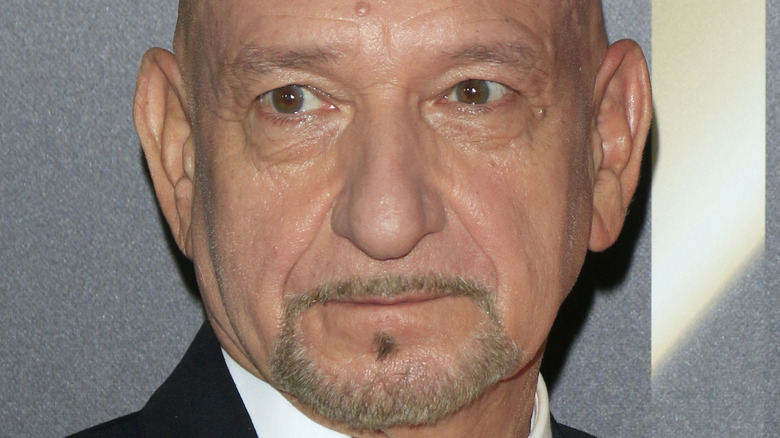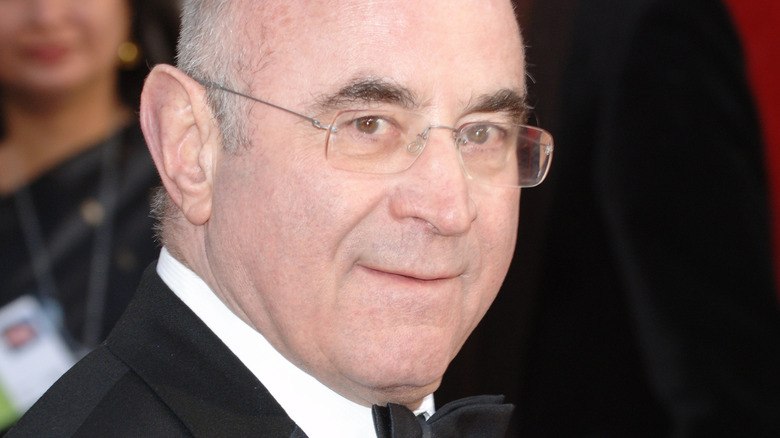Actors Too Good For The Movie They Were In
Here's the thing about acting: as much as it's a creative field driven by a passion for the arts that has provided us with so many touching, emotionally affecting moments, it's still a job. And, like any job, there are occasionally days where you're just going through the motions without actually getting a lot out of it other than that sweet, sweet paycheck.
So whether it's actors who were slumming it for the money, taking a vacation in the form of a location shoot in the Bahamas, or just working a job until the next prestige project came along, we've got a look at some stars who were just too good for their movies—even if those movies happened to secretly be kind of awesome because they were there.
Michael Caine in Jaws: The Revenge
When he was asked to appear in the fourth installment of the once-proud Jaws franchise, Roy Scheider—whose breakthrough role as Sheriff Martin Brody in the original had given the world famously memorable lines like "we're gonna need a bigger boat"—is rumored to have said that "Satan himself could not get me to do Jaws part 4." And here's the amazing part: that's not the best quote from an actor about how bad this movie is. No, that honor goes to Michael Caine, who was happy to cash the paycheck that came from starring in a movie built on the idea that sharks are not only nature's perfect killing machines, but that they can also understand the concept of revenge.
It's genuinely hard to believe if you've never seen it, but the actual premise of this movie is that there's a great white shark out in the ocean who wants to kill Sheriff Brody's family, and that it's doing this by exploiting a completely unexplained psychic connection it has with Brody's recently widowed wife, Ellen. Despite boasting what is quite possibly the most mind-bogglingly bizarre setup a movie has ever had—and the tagline "this time, it's personal"—it is not a good movie.
Caine, who plays a character named Hoagie, even missed out on receiving his Academy Award for Best Supporting Actor in Hannah and Her Sisters—the first Oscar he actually won after three nominations—because he was on location in the Bahamas. When asked about the film, he dropped the quote that beat Scheider's: "I have never seen it, but by all accounts it is terrible. However, I have seen the house that it built, and it is terrific."
Jeremy Irons in Dungeons & Dragons
Jeremy Irons is a natural villain. He's the kind of actor who can lend a cool, quiet menace to his performance, even in a movie as big and explosive as Die Hard With a Vengeance, or even when playing an animated lion in a Disney movie for babies. When he played Profion, the villainous wizard of the 2000 Dungeons & Dragons movie, however... well, let's just say he rolled a Natural 1 on his Subtlety check.
Seriously, this is not a good movie. Rather than adapting one of the many D&D novels or attempting to bring all the fun stuff about the game to life—it's just like Lord of the Rings, but with more rules and math! Who doesn't love that?—the people behind the film ended up with a monumentally generic fantasy setting where the most likable character was Marlon Wayans as a cowardly thief named "Snails."
But Irons doesn't let the material drag him down. His performance is a master class in scenery-chewing, and the best things by far about this movie are the scenes in which he's literally shaking while screaming things like "let their blood rrrrrraiiiiin from the skyyyyy!" He's clearly having fun, even if the audience isn't.
Sir Ben Kingsley in Bloodrayne
In 1982, Sir Ben Kingsley starred in Gandhi, the biography of the world-famous pacifist who nonviolently led the charge for India to gain its independence from British colonization. That film was nominated for 11 Academy Awards and won eight, including Best Picture, Best Director, ad Best Actor for Kingsley. Twenty-three years later, Kingsley joined a cast that included Meat Loaf and Billy Zane for BloodRayne, the film adaptation of a video game that isn't even the fifth best movie about a half-vampire.
To be fair, while Kingsley's phoning it in pretty hard, it's not exactly his fault that he wound up in a bad movie. This is, after all, another fine entry in the canon of Uwe Boll, the director responsible for a string of notoriously terrible video game flicks that were essentially made to exploit a loophole in German tax law. On top of that, the character he's playing is stitched together from a pile of assorted clichés that tread the narrow line between offensive and boring.
That said, Kingsley doesn't exactly help matters. While he's clearly an actor capable of much, much more, he plays the villain of the film as cold and emotionless —which is a nice way of saying that it seems like everything he says is read from a script he's seeing for the first time.
William Marshall in Blacula
William Marshall was a classically trained Shakespearean actor with extensive experience on Broadway and was once hailed by the London Sunday Times as "the best Othello of our time." In the wider world of pop culture, however, he's definitely most famous for playing the title role in 1972's Blacula and its amazingly titled sequel, Scream Blacula Scream. Oh, and for being the King of Cartoons on Pee-Wee's Playhouse, but that's more of a supporting role.
Don't get us wrong: Blacula is actually a pretty awesome movie, and even stands as one of the first horror movies to star a black actor in the lead role. Marshall's performance as Mamuwalde, an African prince who strikes a deal with Dracula and ends up as a vampire himself, is downright commanding, and he insisted that the character be written with dignity rather than as a bumbling punchline. It was even commercially successful, riding the early '70s Blaxploitation movement to become one of 1972's highest-grossing films.
Still, while Marshall was by no means slumming it for the paycheck, and while Blacula might've brought him to a much wider audience than he ever would've reached on the stage, it's still a movie in which his performance is elevating the material rather than the other way around. With a pun like Blacula as the title, this movie would've been made with or without him. We're just lucky he took the job.
Cary Hiroyuki-Tagawa in Mortal Kombat
Okay, real talk: if Cary Hiroyuki-Tagawa is in a movie, he is always, 100% of the time, the best part of that movie. That dude is magnetic, an incredibly charismatic actor who, with the exception of his turn as an affable surf bum in the Disney Channel's snowboard-themed epic Johnny Tsunami, is almost always cast as the villain and kills it every single time. He's even great in NetForce, and that was a movie about the Internet made in 1999 that seems like it was written by your grandparents who need detailed instructions on how to get to Facebook.
In 1995, though, CHT landed what is arguably his most prominent role when he was cast as Shang Tsung in Mortal Kombat, which he reprised on the Mortal Kombat Legacy television series—and again, he's the best part. One of his great gifts as an actor is that he knows when to go as far over the top as he can, and when you're starring in a movie based on a franchise that's literally defined by four-armed monsters tearing people's spines out, you know that it's not really time for a reserved, understated performance.
Unfortunately, nobody else involved seemed to get that memo. Mortal Kombat hit theaters with a PG-13 rating, meaning that all the gore-tastic, blood-soaked fatalities that fans loved from the arcade were missing—although they did leave in the part where Johnny Cage punches people directly in the balls. The end result is a movie that lacks the one thing that could make it stand out among other action movies based around martial arts tournaments, and even CHT's considerable acting prowess couldn't save it.
Cate Blanchett in Indiana Jones and the Kingdom of the Crystal Skull
Huh. Well, this is embarrassing. It looks like someone made a mistake in the notes here and accidentally wrote that there was a fourth Indiana Jones movie where Indy fights aliens and has a son played by Shia LaBeouf. It's really weird, because as we all know, there were definitely only three movies in that series. Heck, there might've only been two and a half.
If, however, there was a fourth Indiana Jones movie, then Cate Blanchett would've definitely been too good for it, especially if it ended with her character being, say, sucked into another dimension by telepathic aliens. If our notes were accurate and there was such a film that was released in 2008, then that would've meant it was filmed well after Blanchett had won an Academy Award for Best Actress. Then again, everyone in such a movie would've probably been slumming it, which is probably why it definitely never, ever happened.
Ever.
Lucy Liu in Shanghai Noon
Shanghai Noon isn't bad. It's not exactly groundbreaking or anything—it's really just Rush Hour set in the old west—but there's a lot of solid action, and Jackie Chan starring in a big-budget Western with his signature blend of action and comedy is a recipe for a pretty good time.
That said, it's not his best work either, and it's definitely not Lucy Liu's. She's perfectly fine in the role of Princess Pei-Pei, but there's just not much for her to do. With almost all of the focus on Jackie Chan and Owen Wilson having wacky buddy cop adventures in cowboy times, Pei-Pei is little more than a MacGuffin, a plot device designed to get the main characters from one stunt-filled set piece to another. Liu's work in movies like Kill Bill and on TV's Elementary have shown how great she can be at action, comedy, and even tightly focused character work, but this is a part that could've been played by anyone, up to and including a decorative lamp.
The good news—such as it is—is that as long as Ballistic: Ecks vs. Sever exists, Shanghai Noon will never be the worst entry on her résumé.
Glenn Close in Mars Attacks!
Mars Attacks is weird. Not in the sense that it's a movie where strange things happen, although it's certainly that, with an approach to storytelling that's clearly trying to be as quirky as possible. It's weird in that it actually somehow exists.
It's in the same category with stuff like Space Jam, where just stopping for a minute and thinking about the number of decisions that led to this thing being a real movie makes makes your brain shut down and go into Safe Mode so it doesn't start leaking out of your nose. It's a big-budget, star-studded blockbuster based on a series of hyper-violent trading cars from the '60s that ends when lounge singer Tom Jones teams up with football legend and Blaxploitation star Jim Brown, who at one point gets into a fistfight with aliens while dressed as an Egyptian pharaoh. And again, this is a movie that actually happened. It was in theaters.
Considering that the movie featured a pretty incredible roster of talent, it's difficult to single out one person as being out of place among the rest. Jack Nicholson, for instance, plays two different parts, and if his track record in choosing projects wasn't as spotty as it's become, he'd probably get the nod just for that. Glenn Close, however, doesn't even make it out of the movie's opening act before she's crushed to death by a chandelier, and if that's not the definition of "she deserved better," we don't know what is.
Bob Hoskins in Super Mario Bros.
When you get right down to it, Super Mario Bros. should've worked, and Bob Hoskins is almost perfect for the part of Mario. Admittedly, he's not Italian, and we imagine that, like any actor would be, he was probably very nervous about stepping into the role so brilliantly defined by "Captain" Lou Albano, but think about it. His performance in Who Framed Roger Rabbit? is so genuinely brilliant that there's never a moment in that movie where you don't think Eddie Valiant is interacting with a cartoon character. If he can pull that off, then pretending to stomp on Koopa Troopas in a world of floating bricks and super mushrooms should be a piece of cake, right?
Unfortunately, that's not really what happened. You'd think that having a storyline as monumentally simple as "run left to right, jump, save princess" would've made Mario Bros. a pretty difficult story to screw up, but the filmmakers somehow managed to drop the ball so hard that it registered on the Richter scale. As bizarre as the Mushroom Kingdom of the video games might be, the one in the movie is mystifying, a weird modern dystopia where all of the enemies from the games are turned into truly horrifying nightmare versions of themselves.
Or, you know, Dennis Hopper. But that's basically the same thing.
Sir Patrick Stewart in The Emoji Movie
Patrick Stewart literally plays a talking pile of poop in a movie about emojis. There's literally nothing we can add to that, other than to say that we genuinely hope the dune buggy that he definitely bought with his check from this thing was a good one. He seems nice, he deserves to have a little fun.
Raul Julia in Street Fighter
So here's the thing about Street Fighter: it actually rules. Sure, it might not be a "good" movie in the traditional sense, with a script that frequently wanders into nonsense and a premise that takes the video game's straightforward setup and turns it into a convoluted mess that involves arms dealing, international politics, and undercover reporters, but it's also ridiculously fun, and Raul Julia's genuinely amazing portrayal of M. Bison is responsible for about 99 percent of that.
To say he's chewing scenery or going over the top with his performance doesn't quite cover it, because both of those phrases imply that he's somehow going beyond what the material demands. That's not what's happening here at all—the movie's version of Bison is the kind of supervillainous megalomaniac who sneers lines like "what's the matter, Colonel? You came here expecting to fight a man, and instead you found... A GOD?!" and has an entire financial plan based on printing up his own money and then kidnapping the Queen of England in order to set up the exchange rate. As big and bold as Julia goes with his take, it's perfectly in keeping with how that character is written, and it's so good.
Sadly, Street Fighter was also Julia's last movie, a part he took despite suffering from stomach cancer because his children were fans of the game. But while it's often written that it's a shame that his final role was in a "bad movie"—and while his death at the height of his career is truly tragic—Julia's performance is beautifully, unironically fantastic, and stands as a testament to how great he could be. For us, it's one of the most fun, self-aware, and endlessly quotable performances ever to grace a goofy video game adaptation. For Raul Julia...it was Tuesday.


